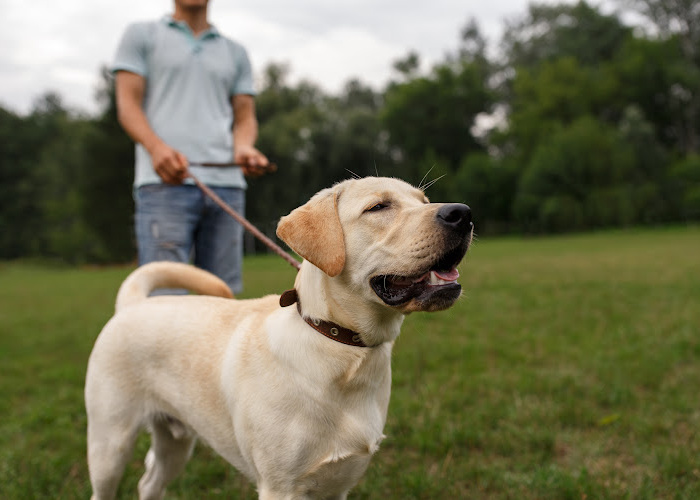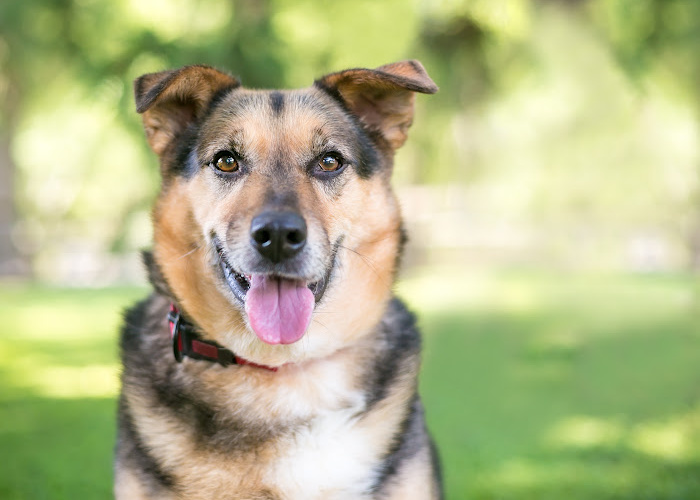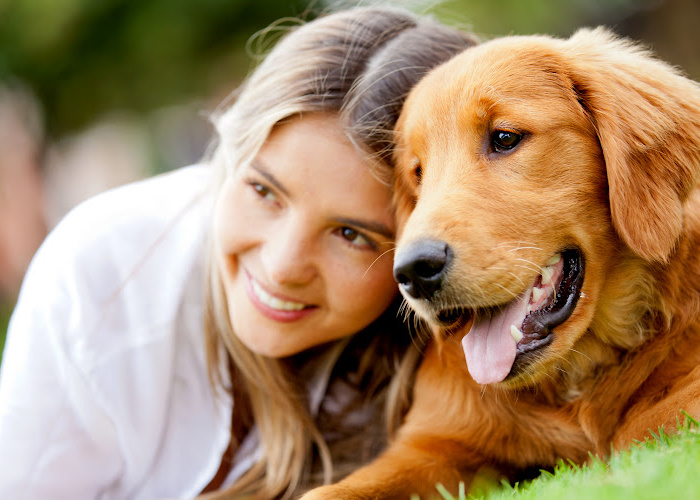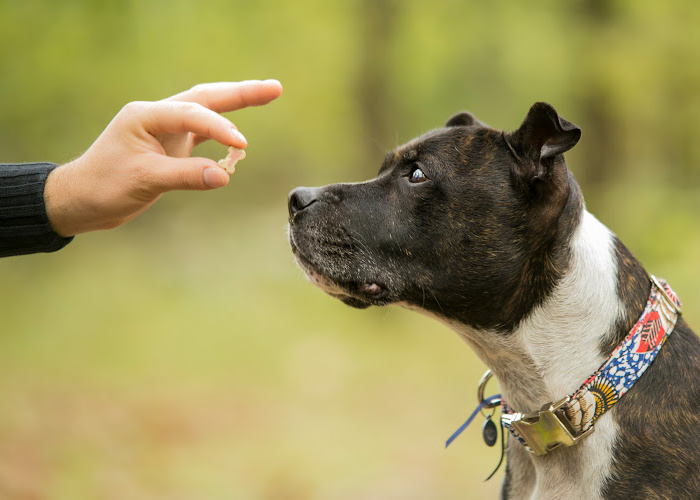Can dogs have autism

Dog Autism Signs, Symptoms & Treatments
Dog Autism Signs, Symptoms & Treatments
Since research has advanced so much over the years, we are learning more and more about the disease called autism. While we may be familiar with this diagnosis in humans, many are starting to believe it may affect our canine companions. So can dogs have autism?
In this article we will dive into the topic of autism in dogs. Our goal is to help you understand what this tentative diagnosis could mean for your furry friend.
Can Dogs Have Autism?
Though this has become a controversial topic in the veterinary world, the subject of autism in dogs is gaining more traction. Autism is a condition that impacts the way a person views the world. It includes social and developmental complications that come along with it. Those with autism generally fall into a spectrum of impaired interactions and behaviors. They often have a combination of unique symptoms that impact their daily life.
So can dogs be autistic as well? Though we cant accurately gauge a dogs social interactions as we do in humans, scientists have been recording autism-like behavior in dogs since the 1960s. The research could point to an official diagnosis of autism in dogs one day. It simply states that this condition could be possible. So if you think your dog has autism, its time to read along and see if your dog falls into any of the behavioral criteria that we will dive into below.
What Can Cause Autism In Dogs?
Though the topic of autism in dogs is still being researched, some scientists do believe there are possible causes behind autism-like behavior in dogs. Veterinary professionals cant say that these are definitive causes.
These possible causes of autism in dogs include:
- Genetics, and that it could be a hereditary condition
- Lack of neurons within the brain (there is ongoing research on this possibility)
- Underdeveloped connections within the brain
- Improper socialization
Dog Autism Symptoms
Since possible autism in dogs is a condition that affects their social behaviors, most of the possible symptoms include underdeveloped social skills and behaviors. Though autism is not yet an official diagnosis, there are some common signs and symptoms in dogs that are thought to be autism candidates.
The most common symptoms of possible autism in dogs includes:
- Chronic behavioral problems that wont seem to resolve
- Poor socialization skills with other dogs
- Poor socialization skills with humans
- Not responsible to calls, for example their own name
- Disinterest in activities that most dogs love, like playing with toys, playing with their owners, etc.
- Easily experiencing sensory overload with noises, stimulation, etc.
- Unable to concentrate on activities or skills that dogs usually enjoy
Since many of these symptoms can be a result of other behavioral and medical conditions, its important to speak with your vet if your dog ever experiences any of the above behavior.
How To Diagnose Autism In Dogs
Possible autism in dogs is an extremely tricky condition to diagnose. Since autism is yet to be officially recognized as a possibility in our canine friends, you may not ever receive the actual diagnosis from your veterinarian. If you think that your dog may have autism, there are a few behavioral assessments that may help your doctor in accepting the possibility.
Behavioral disorders and other conditions like this are more challenging to diagnose in dogs. Since so many of these conditions have such a broad spectrum of symptoms and no set diagnostic tools, you may only receive a tentative diagnosis. Similar to anxiety in dogs, most vets will often recommend environmental changes and mood stabilizing medications to try and relieve any severe behavioral symptoms.
In order for a vet to consider the possibility of a dog having autism, the dog must show chronic behavioral patterns that allude to the condition. Your veterinarian may perform diagnostics to rule out other medical possibilities that could cause these symptoms. Only then they may consider the chance that a dog has autism-like behaviors.
Can You Treat Dog Autism?
Autism in dogs is yet to be officially recognized, so there is no set treatment plan for the possible condition. Since the only problems that can be addressed are the behavioral issues that a dog presents, the best treatment option is to meet the dog where they are struggling. Most dogs that struggle with possible autism generally have their own set of triggers. Its important to try and help them with these situations.
Make Adjustments That Benefit Them
For example, if you know that your dog struggles with interactions with other dogs, you should try to support them in these situations and avoid canine conflict when possible. Another example would include a dog that suffers from severe separation anxiety, and trying to adjust your schedule to allow for more time at home. Most of these behavioral struggles improve most when a dog owner offers a solution in the dogs environment. Making your home a safe zone for your struggling dog can help to improve their life immensely.
Offer A Stress Free Life
One of the biggest triggers for dogs with autism is excess stress. A chaotic life is stressful enough for a dog, but can be detrimental for a dog that struggles with possible dog autism. Since these dogs do not have the ability to cope in stressful situations, they often struggle greatly. Because of this, its important to offer as stress free of a life as possible.
This may mean:
- Offering your dog a quiet environment
- Avoiding people coming and going from your home
- Avoiding extended periods away from home
- Offering a safe zone like a crate or comfortable bed, and more.
Exercise
Mental stimulation and positive exercise can relieve stress in dogs with autism. Excess energy can cause any dog to become anxious, but especially dogs that struggle with autism or other behavioral issues. Not only can excess energy cause a dog to experience stress, but it can also result in even more behavioral issues within your home. Try your best to offer your dog mentally stimulating toys, enjoyable exercise, and any other activities that take their mind off their struggles.
Medication
If your dog needs medical intervention, there are medication options that help dogs work through severe anxiety and other behavioral issues. Some dogs cannot find relief in changes within their environment alone, and require extra veterinary care to find comfort. If you think your dog has autism that cannot be resolved with daily changes, you can speak with your veterinarian about medical intervention.
Special Needs In Dogs
So can dogs have special needs? Since our dogs are just as prone to medical conditions that can impact their daily lives, there is no doubt that dogs can be considered special needs. If a furry friend has a condition that requires a bit of extra help on our part, that means they fall into the category of dogs with special needs.
A dog with special needs is no less lovable than any other pup, and can bring immense joy to our lives. Almost any condition has a list of management options that can help to improve their lives, and can offer them a brighter future. Just be sure to speak with your vet about your concerns with your pup, and they can point you in a positive direction.
Final Thoughts About Autism in Dogs
Though autism in dogs is still being researched, its clear that the possibility of this condition in dogs is on the map. Be sure to review the information we discussed above on and know that there is help for dogs who may have autism or some kind of special needs.
My name is Amber. I am a dedicated animal lover that turned my passion into my career. I am a Licensed Vet Tech with 12 years of experience in veterinary medicine, but I recently took my career online to help spread accurate information on animal care. With how vast the online world is, I have a strong desire to ensure that the reader always walks away with helpful pet advice. With the experience Ive gained from my time in this field, I have been able to travel the world, offering my services to as many animal rescues as I can find. If I am not at my laptop, or back home visiting family, you can find me somewhere in the world, cuddling every furry friend that I can find! More About Us
Can Dogs be Autistic? 5 Major Symptoms and Treatments
The mystery behind Autism in Dogs
Veterinarians prefer to call this condition canine dysfunctional behavior instead of canine or dog autism, even when the symptoms are almost the same. The reason is that the science behind this behavioral rareness is still in diapers as the medical community doesnt fully understand this.
There are not enough studies or researches that can tell for sure what this autism in dogs is about, leaving us in the shadows. Isnt a surprise to see veterinarians reluctant to diagnose this rare condition, as it would be irresponsible to say this being 100% sure.
To dm Miklsi, leading expert on canine behavior from Scientific American, answers the question do dogs have mirror neurons? saying that dogs very likely possess mirror neurons, but we have no concrete proof just yet. Neuroscientist Giacomo Rizzolatti of the University of Parma in Italy and his colleagues discovered mirror neurons by accident during the 1990s, when they were studying motor neurons in rhesus monkeys.
Even though there are no official studies on this condition, according to some scientists that have been studying the mirroring neurons in dogs brains concluded that the dogs that presented the symptoms lacked those neurons and decided that those missing neurons are precisely the cause of the autism in dogs.
As this would be a neuronal difference, the dogs cant get sick with autism. The dog would have to be born with this condition, inherited from a relative, to present these symptoms.
Nevertheless, the cause has not been scientifically proven yet, and it remains unknown.
The missing mirroring neurons
Can Dogs Be Autistic? The Ultimate Guide to Canine Autism
Have you ever watched your furry friend and wondered if their unique quirks were something more? If youve pondered, Can Dogs be Autistic? youre not alone. The idea of autism in dogs is gaining attention as pet owners and researchers observe autism-like behavior in dogs.
While our tail-wagging companions cant tell us how they feel, we can learn to read the signs of potential canine autism symptoms.
From repetitive actions to social withdrawal, the concept of dog autism is complex, but with the right guide, you can unlock a better understanding of dog behavioral disorders and how they may manifest in your beloved pet.
Stay tuned as we explore the nuances of this topic and provide you with the knowledge to foster a happier, healthier life for your four-legged family member.

Understanding Canine Autism and Its Relation to Dogs
When you notice peculiar behaviors in your furry friend, you might wonder, is autism possible in dogs? The concept of autism, widely recognized in humans as Autism Spectrum Disorder (ASD), raises intriguing questions about canine cognition and behavioral health.
While our understanding is still evolving, the current wisdom indicates that dogs could express signs of autism in dogs through various actions that seem uncharacteristic of normal dog behavior.
Perhaps youve spotted potential symptoms of autism in dogs, such as a lack of interest in social activities or a fascination with repetitive movements. These could be signs your dog is struggling with sensory processing or social integration issues that echo human experiences with ASD. Lets consider the following key points:
- Repetitive Movements: Behavior such as relentless tail chasing or toy lining could be a reflection of your dogs need for consistent patterns.
- Social Challenges: If your dog seems indifferent to interaction with humans or other dogs, these could be indicators of social difficulties associated with ASD.
- Sensory Sensitivity: A dog startled by everyday sounds or textures may be exhibiting signs of heightened sensory sensitivity, a common trait in autism diagnosis.
However, these signs necessitate a professionals insight since the question of is autism genetic in dogs, or if it stems from other factors, remains a topic of research. Responsible pet ownership demands a cautious approach; identifying a diagnosis of autism in dogs is not to be taken lightly. The condition may resemble other behavior disorders and requires an experts evaluation.
Whether autism in dogs is due to genetics, environmental factors, or an intricate blend remains uncertain. While we navigate these unknown waters, its essential to seek advice from veterinarians or animal behaviorists. They can offer a reliable autism diagnosis in dogs and guide you through the nuances of dog psychology and physiology, ensuring that you provide the best support for your beloved pet.

Can Dogs Be Autistic: Examining the Behavioral Symptoms
When exploring the intriguing concept of autism spectrum disorder in dogs, one may wonder about the specific autistic behaviors in dogs that parallel those found in humans.
As you become more attentive to your furry companions actions, its essential to distinguish between typical dog quirks and potential signs of a deeper neurodevelopmental disorder.
Signs of Autism in Dogs
Autism in dogs symptoms might not be immediately apparent, but once you know what to look for, they can be revealing. For instance, a dog that doesnt seem to bond with its owners or shows little interest in other dogs could be displaying a red flag. Other signs might include an unusual sensitivity to sensory stimuli or a disconcerting indifference to activities that typically excite dogs.
Patterns of Repetitive Behavior
Theres quirky, and then theres concerning. If your dog is chasing its tail occasionally, its probably nothing to worry about. But if this becomes a compulsive act where they engage in the behavior to the point of exhaustion, or if they lick persistently in the absence of a medical issue, you might be looking at patterns of repetitive behavior, characteristic of dog socialization challenges.
The Complexity of Social Interactions and Communication
Communication is at the heart of socialization; this is true for humans and dogs alike. Dogs generally have a natural inclination to engage with their environment, but dog communication difficulties, such as lack of eye contact or response to your calls and commands, can be symptomatic of an autism-like condition.
Neurodevelopmental Disorder in Dogs: Is Autism a Possibility?
Do dogs have autism in the same way humans do? This question continues to spark debate among veterinarians and animal behaviorists. While theres no clear-cut answer, certain genetic markers, such as mutations in the SHANK3 gene, suggest that dogs may experience a condition closely related to the autism spectrum disorder in humans.
As research unfolds, new insights pave the way for better understanding and supporting dogs who exhibit these behaviors. To truly cater to your dogs needs, its crucial to recognize and properly address these challenges with empathy and informed care.

Therapeutic Interventions and Managing Autism Spectrum Disorder in Dogs
If youre exploring treatment options for dogs with autism, its important to understand that each dog is unique. Theres a spectrum of therapeutic strategies to consider that can significantly enhance your dogs quality of life.
In this section, well delve into behavioral modification techniques, the perks of environmental enrichment, the modulating influences of diet and supplements, and the crucial step of seeking professional guidance.
Behavioral Modification Techniques
Behavioral therapy for dogs is a cornerstone in managing canine autism spectrum disorder (ASD). By implementing routine training and structured activities, you can help your dog overcome specific challenges like repetitive motions, which often lead to lower levels of stress and enhanced wellbeing.
- Positive reinforcement to encourage desired behaviors
- Consistency and patience in training routines
- Canine assistive technology that promotes interaction
Environmental Enrichment Benefits
Creating an engaging and stimulating environment can play a transformative role in your dogs life. Adding sensory toys, agility equipment, and providing opportunities for mental stimulation can break the monotony and keep your dog active and engaged.
- Interactive toys to stimulate cognitive functions
- Safe spaces for retreat to reduce anxiety
- Sensory gardens or walks that offer new scents and experiences
Role of Diet and Supplements in Managing Symptoms
Its no secret that diet affects behavior, and this also rings true for dogs with autism. Incorporating calming supplements for dogs can be a game-changer, offering natural relievers like L-theanine and chamomile. And lets not forget the much-talked-about CBD oil for dogs with autism, which has shown promising results for reducing anxiety and enhancing mood stability.
- Nutraceuticals designed to support neurological health
- Omega-3 fatty acids for brain function optimization
- Specialized therapeutic diets tailored to your dogs specific needs
When to Seek Professional Advice
Recognizing when its time to consult a professional is paramount. Should the symptoms of ASD become more pronounced, or you find yourself uncertain about the right approach, reach out to a vet or a certified animal behaviorist. Their expertise can provide a personalized treatment plan for your canine friend and steer you towards the appropriate interventions and resources.
Remember, youre not alone in this. There are communities and professionals who specialize in the treatment of dogs with ASD. With the right support, you can ensure that your dog leads a comfortable and fulfilling life, irrespective of the challenges ASD might pose.

Conclusion
In navigating the nuanced landscape of dog neurological disorders and dog behavioral disorders, understanding the symptoms that may resemble autism is vital. Though the existence of autism in dogs isnt definitively established, behaviors observed in canines have spotlighted the question and challenged us to explore the possibilities. Differentiating between what might be standard for your dog versus what may signal an underpinning condition is essential. Mislabeling regular dog behavior or unrelated medical concerns as canine autism symptoms could lead to unnecessary confusion or misguidance.
Augmenting the quality of life for dogs with autism demands a hands-on approach, tailored to each dogs individual needs. As a pet owner, offering support for dogs with autism means being patient and attentive, promoting a dependable routine, and engaging in therapies conducive to your dogs comfort and security. The overarching goal is effective managing of canine autism symptoms, geared towards creating a nurturing environment where your dog can thrive despite any challenges.
The path ahead beckons further inquiry and understanding. With advancements in veterinary research, the hope is to demystify the complexities surrounding autism-like behaviors in our dogs, sharpen diagnostic tools, and refine strategies to support them. Your commitment to their well-being and adapting to their unique circumstances can pave the way for a happier, more connected life with your canine companion.

FAQ
Can dogs be autistic?
While theres no definitive answer, dogs can exhibit behaviors that are suggestive of autism spectrum disorder (ASD), such as social withdrawal and repetitive actions. However, these behaviors may also indicate other neurodevelopmental or behavioral disorders.
What are some signs of autism in dogs?
Signs that may indicate autism-like behavior in dogs include difficulties with social interaction such as lack of interest in other dogs or people, repetitive movements like tail chasing, unusual sensitivities to sensory stimuli, and inconsistent responsiveness to commands.
Is autism genetic in dogs?
Research suggests there may be a genetic component to certain autism-like behaviors in dogs. Mutations in specific genes, similar to those associated with human autism, have been observed in dogs displaying these behaviors.
How is autism diagnosed in dogs?
Diagnosing autism in dogs is a complex process that relies on behavioral observations and the exclusion of other conditions. A veterinarian or a canine behaviorist can evaluate a dogs symptoms to determine if they align with autism-like behaviors.
How can I manage my dogs autism-like symptoms?
Management may include behavioral therapy, environmental enrichment, targeted diets, and calming supplements. Interventions such as CBD oil have also been suggested for helping to stabilize mood and reduce anxiety.
When should I seek professional advice for my dogs behavior?
If you observe any concerning behaviors in your dog that may suggest autism-like symptoms or other neurodevelopmental disorders, its important to consult with a veterinarian or a canine behaviorist for a thorough assessment and guidance on appropriate treatment options.
Can environmental enrichment help dogs with autism?
Yes, environmental enrichment, including sensory stimulation and cognitive challenges, can help to improve the quality of life for dogs with autism-like symptoms by reducing stress and providing appropriate outlets for their behaviors.
Are there specific dietary considerations for dogs with autistic behaviors?
While there is no one-size-fits-all diet for dogs with autism-like behaviors, some may benefit from diets formulated to address anxiety or hyperactivity. Ingredients such as L-theanine and chamomile might be helpful as well.
Can assistive technology be used to support dogs with autism-like symptoms?
Assistive technologies are emerging for dogs with behavioral and neurological challenges, including autism-like symptoms. Items such as specialized toys and puzzle feeders can offer mental stimulation and aid in managing repetitive behavior.
How important is routine for a dog that may have autism?
A consistent and stable routine can greatly benefit dogs with autism-like symptoms by providing a structured environment that reduces anxiety and helps manage expectations for both the dog and the owner.









